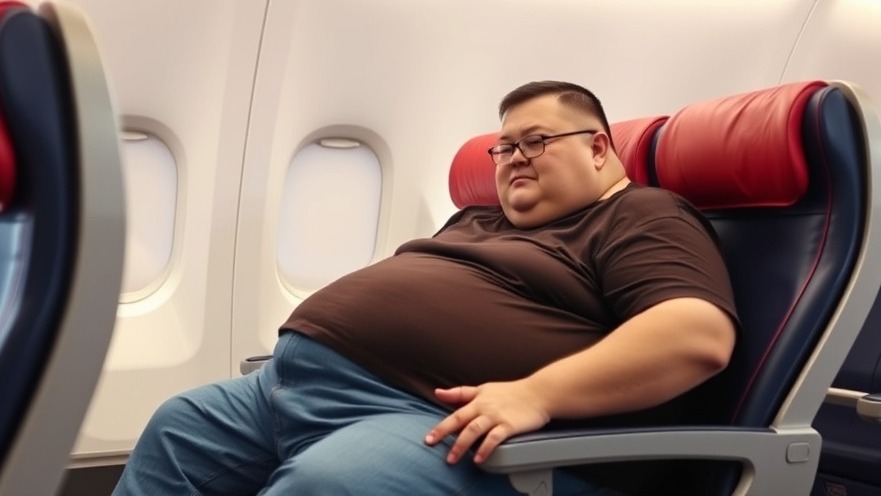
The New Southwest Policy: A Shift in Airline Practices
As of January 27, 2026, Southwest Airlines will be implementing significant changes to its policy on extra seating for plus-size passengers. This policy shift involves passengers who require an additional seat having to purchase it at the time of booking. Currently, travelers can opt for a free extra seat option at the airport, but this will no longer be available under the new regulations. According to Southwest, this change is part of an overhaul tied to the introduction of assigned seating, a move that has sparked considerable debate among frequent flyers.
Understanding the Implications for Plus-Size Travelers
The changes are seen as a direct response to the pressures Southwest has faced as it shifts toward a more standardized approach in line with other carriers. Travel industry experts, including Jason Vaughn, who runs the Fat Travel Tested website, argue that this move complicates the travel experience not only for plus-size passengers but for all travelers. The potential for discomfort and an impersonal flying experience looms larger with additional financial burdens on passengers who must now navigate this policy. Such adjustments reflect a broader trend within the airline industry where customer-oriented perks are increasingly sacrificed for profitability.
The Legacy of Open Boarding: A Change for All
The introduction of assigned seating alongside this new policy represents a seismic shift in how Southwest Airlines operates. The open boarding system, previously a hallmark of the brand, allowed passengers a level of freedom and comfort that is now at risk. Critics of this policy argue that the move to assigned seating not only alienates long-time clients but erases a fundamental aspect of what Southwest has represented in the airline industry. This cultural shift raises questions about customer loyalty and the potential fallout from departing from its original brand identity.
Reflections on Industry Trends: Are Airlines Losing Their Identity?
This change is not just an isolated incident; it reflects a broader trend within the airline industry. As companies face increasing pressures from shareholders to enhance profitability, many have done away with policies once considered standard perks. The recent elimination of the “bags fly free” policy reinforces this observation. Airlines that once prided themselves on customer service and experience are now prioritizing corporate profitability, diminishing their customer relationships.
Potential Future Impacts: What Does This Mean for Travelers?
As major airlines continue to tighten their rules and increase fees, passengers must brace for changes that could affect their travel experiences profoundly. Expect longer wait times in booking and more financial hurdles when planning a trip, especially for those who require specific accommodations due to size or health needs. This could lead to a ripple effect impacting airline choice, with travelers increasingly seeking carriers that respect and support their needs over those that prioritize profits.
Decisions Passengers Can Make: Staying Informed
Travelers can take advantage of the current policies while they remain effective. For those who may need additional seating, booking in advance has now become crucial. Understanding these terms and conditions will not only provide a smoother experience but also potentially save costs. It's essential to be aware of how these changes affect itinerary flexibility, especially in terms of refundability that is now more restrictive under the new system.
Complexities of Refund Policy: Understanding Your Rights
With the new policy in place, passengers who purchase an additional seat may find the refund situation more precarious. Refunds will be available only if certain criteria are met, including both tickets being booked in the same class and the flight not being fully booked at departure. This change may lead to confusion among passengers as they navigate the new terms, highlighting the need for clear communication from the airline to its customers.
A Call for Awareness and Advocacy in Air Travel
Passengers concerned about the implications of the tightened rules should find ways to voice their experiences. Engaging with customer service, participating in feedback surveys, or joining consumer advocacy groups can help airlines understand the impact of their policies. Advocacy becomes essential in ensuring that the perspectives of all travelers—especially those requiring additional support—aren't relegated to the background in the pursuit of profit.
As Southwest Airlines transitions towards these new policies, passengers can take proactive measures to ensure their needs are met while navigating the evolving landscape of air travel. While change can often lead to discomfort, being well-informed can empower individuals to make choices that align with their travel experiences.
 Add Element
Add Element  Add Row
Add Row 



Write A Comment